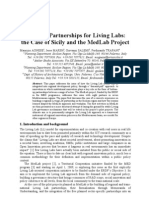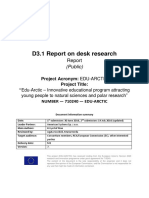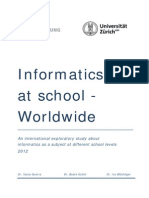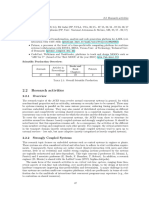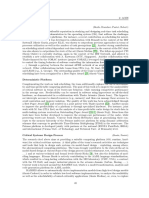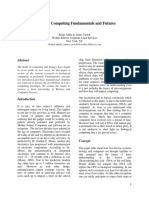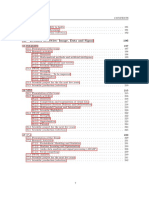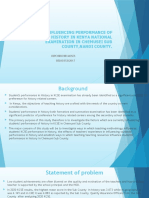1.6 Scientific Project: 1.6.1 Analysis of The Current Situation
1.6 Scientific Project: 1.6.1 Analysis of The Current Situation
Uploaded by
Hernan BenitesOriginal Description:
Original Title
Copyright
Available Formats
Share this document
Did you find this document useful?
Is this content inappropriate?
Report this DocumentCopyright:
Available Formats
1.6 Scientific Project: 1.6.1 Analysis of The Current Situation
1.6 Scientific Project: 1.6.1 Analysis of The Current Situation
Uploaded by
Hernan BenitesCopyright:
Available Formats
1.6. Scientific project 1.
General information
• Uncertainty about the financing of the NewUni project. These kinds of projects of major
importance for the country require a lot of support in the first years, so long as the model on
which the project is conceived can function fully and show its efficiency. All the research activity
of NewUni, including the LTCI, will be impacted by whether we will get this support or not
and its importance.
• Lack of support from the staff to the school relocation. The move to Saclay does not please
the staff members who expect difficulties related to the lengthening of the distance between
their workplace and their place of residence. Thus, there is a risk of losing some of our good
researchers because of this move and, probably, difficulties in maintaining at the current level
all the excellent collaborations we have with our partners in Paris.
1.6 Scientific project
This section presents the project of the LTCI. To better understand the perspectives for the LTCI,
we first discuss the current situation in Section 1.6.1, then we present the project of the laboratory
in Section 1.6.2.
1.6.1 Analysis of the current situation
LTCI is a laboratory of Télécom ParisTech (Institut Mines-Télécom) and one of NewUni’s main
laboratories in the field of Information and Communications Technology (ICT), in terms of size
and terms of scientific production. Its mission is to contribute, by the excellence of its research,
to the advancement of the knowledge in the field of information sciences and the development
of the potential of French innovation in the digital domain. Fully integrated into the NewUni
project, where it is considered as one of the pillars of the Faculty of Data Sciences and Information
Technologies, LTCI aims to contribute to some of its major objectives, namely the development
of scientific research at the highest level, the strengthening of the PhD Program, the emergence
of interdisciplinary research, and the development of the innovation potential and transfer to the
industry.
LTCI is composed of 3 research and teaching departments, gathering 16 teams and covering
different scientific disciplines in the ICT field. As each department operates autonomously, han-
dling such a diversity while targeting the emergence of a collective vision is not an easy task. To
strengthen the link between the lab and its teams and enable the LTCI to better play its role, we
carried out the five actions mentioned in the SWOT analysis (threats in Section 1.5), following
the end of the partnership with CNRS. We also opened a discussion on the recomposition of the
teams, regardless of frontiers of the departments, and called for the recomposition of the teams
around a clear scientific project carried by a team leader freely chosen by the members of the
team. This took us more than six months in 2017. It results in few changes in the composition of
the teams, but we succeeded in clarifying the scientific project of each team and in clarifying the
role of the teams and their responsibilities.
The work done for the definition of the scientific projects of the teams led to a set of documents,
summarizing the main expertise of each team, their main scientific objectives, and the associated
SWOT analysis. It gives us a global vision of the expertises of the lab and the complementarity
between its teams. The project described below gives our current vision of the strategy of the lab
for the coming years, based on the scientific projects of the teams and the SWOT analysis given
in the previous section. This strategy could evolve during the next period, especially with the
creation of NewUni and the definition of a global strategy for this new university.
1.6.2 Perspectives and project
In the past years, the LTCI has contributed to the emergence of new ideas and techniques to
tackle the challenges raised by the digital transformation and the key societal transitions. Among
theses challenges we can mention three that are in the core interests of the LTCI: security and
22
You might also like
- PID Template To SubmitDocument81 pagesPID Template To SubmitMahendra paudel PaudelNo ratings yet
- Steps in Theatre Project PlanningDocument11 pagesSteps in Theatre Project PlanningLCernaMazierNo ratings yet
- The Costs of Networked Learning Phase 2: The Trial of Activity-Based CostingDocument100 pagesThe Costs of Networked Learning Phase 2: The Trial of Activity-Based CostingPaul BacsichNo ratings yet
- Innovative LearningDocument34 pagesInnovative LearningMabel QuirogaNo ratings yet
- A Real-World Case Study in Information Technology For Undergraduate StudentsDocument11 pagesA Real-World Case Study in Information Technology For Undergraduate StudentsVAISHALI RAMESHNo ratings yet
- Ltci Report 2018-13Document1 pageLtci Report 2018-13Hernan BenitesNo ratings yet
- Eindhoven University ThesisDocument8 pagesEindhoven University ThesisBuyCollegePaperOnlineBillings100% (2)
- Transformative Cornerstones of Social Science Research For Global ChangeDocument32 pagesTransformative Cornerstones of Social Science Research For Global ChangefungedoreNo ratings yet
- The Social Sciences and The Humanities: - Use It Don't Lose ItDocument32 pagesThe Social Sciences and The Humanities: - Use It Don't Lose ItJuan David MesaNo ratings yet
- DigCompOrg - European Framework Digitally-Competent Educational OrganisationsDocument77 pagesDigCompOrg - European Framework Digitally-Competent Educational OrganisationsfrechesNo ratings yet
- Project Name: Sponsoring Area: Project Sponsor: Project Manager: Consultant TeamDocument3 pagesProject Name: Sponsoring Area: Project Sponsor: Project Manager: Consultant TeamShubham GoelNo ratings yet
- Web-Based Management of Research Groups - Using The Right Tools and An Adequate Integration StrategyDocument13 pagesWeb-Based Management of Research Groups - Using The Right Tools and An Adequate Integration StrategyhayderNo ratings yet
- Wolkite Poly Technic and Satellite Institute: Project Name Student Management SystemDocument11 pagesWolkite Poly Technic and Satellite Institute: Project Name Student Management SystemsatwptcNo ratings yet
- Future and Emerging Technologies: FET Open Scheme: Challenging Current Thinking and Attracting Future PotentialDocument2 pagesFuture and Emerging Technologies: FET Open Scheme: Challenging Current Thinking and Attracting Future PotentialCourtney MirandaNo ratings yet
- The Horizon Report: 2010 EDITIONDocument40 pagesThe Horizon Report: 2010 EDITIONnewmediaufmNo ratings yet
- The Horizon Report: 2010 EDITIONDocument40 pagesThe Horizon Report: 2010 EDITIONglennmalcolmNo ratings yet
- EDocument335 pagesEmjacquinetNo ratings yet
- Project Management in Research and DevelopmentDocument14 pagesProject Management in Research and DevelopmentEngineer MustafaNo ratings yet
- Green Paper On The Research and Innovation-Policy Implications of Science 2.0Document8 pagesGreen Paper On The Research and Innovation-Policy Implications of Science 2.0hkdxiutlg100% (1)
- The Last Version of Gruop ProjectDocument43 pagesThe Last Version of Gruop ProjectletaNo ratings yet
- Software InnovationDocument23 pagesSoftware InnovationEthics4EUNo ratings yet
- Technology Plan FinalDocument10 pagesTechnology Plan FinalrustoryhufNo ratings yet
- H.10 Quality Ecec in Italy: Teaching and Learning in The New 0-6 SystemDocument2 pagesH.10 Quality Ecec in Italy: Teaching and Learning in The New 0-6 SystemjulionNo ratings yet
- Template 2: HR Strategy - Action PlanDocument19 pagesTemplate 2: HR Strategy - Action Planabdallah abdNo ratings yet
- Winning Horizon 2020 Open ScienceDocument16 pagesWinning Horizon 2020 Open ScienceaniricNo ratings yet
- Technology AwarnessDocument50 pagesTechnology AwarnessAshok SiriNo ratings yet
- Advances in The Development and Application of Large Scale Experimental Methods in Earthquake Engineering Through The EU FP7 SERIES ProjectDocument9 pagesAdvances in The Development and Application of Large Scale Experimental Methods in Earthquake Engineering Through The EU FP7 SERIES ProjectYisus NuñezNo ratings yet
- Research Report 2011 SmallerDocument139 pagesResearch Report 2011 SmallerNeo Mervyn MonahengNo ratings yet
- Internship ReportDocument71 pagesInternship ReportDavoud ShalforoushanNo ratings yet
- Bridging The Gaps Publication LR EnglishDocument39 pagesBridging The Gaps Publication LR EnglishMichael RobersonNo ratings yet
- 2016 Ipr A5 Fgiv 7966Document3 pages2016 Ipr A5 Fgiv 7966vampiriNo ratings yet
- Regional Partnerships For Living Labs: The Case of Sicily and The MedLab ProjectDocument7 pagesRegional Partnerships For Living Labs: The Case of Sicily and The MedLab ProjectjexxonNo ratings yet
- Policy Instruments To Tackle Social Inequalities Related To Climate ChangeDocument40 pagesPolicy Instruments To Tackle Social Inequalities Related To Climate Changebartosz.hoffmannNo ratings yet
- Ru Bsi Self-Evaluation Report 2017Document118 pagesRu Bsi Self-Evaluation Report 2017Conrad DuncanNo ratings yet
- IIT Bombay Strategic Plan (2017-21) Draft Document: November 30, 2016Document17 pagesIIT Bombay Strategic Plan (2017-21) Draft Document: November 30, 2016Benu MadhabNo ratings yet
- ISC Annual Report 2021 Web VersionDocument69 pagesISC Annual Report 2021 Web VersionIlham AlimuddinNo ratings yet
- Position Paper Horizon EuropeDocument6 pagesPosition Paper Horizon Europeandimir010No ratings yet
- GP 2012-2013Document159 pagesGP 2012-2013captivatingNo ratings yet
- Horizon ReportDocument40 pagesHorizon Reportpetroskid1No ratings yet
- Research Evidence On The Use of Learning Analytics: Implications For Education PolicyDocument152 pagesResearch Evidence On The Use of Learning Analytics: Implications For Education Policya10b11No ratings yet
- D3.1 Report On Desk Research: (Public)Document31 pagesD3.1 Report On Desk Research: (Public)Carmen NelNo ratings yet
- BocconiKampylisPunie 2012 CCR Concept RefParam D.2Document35 pagesBocconiKampylisPunie 2012 CCR Concept RefParam D.2Ramon De castroNo ratings yet
- Research Proposal For Graduation Project On Graduate RetentionDocument7 pagesResearch Proposal For Graduation Project On Graduate RetentionNicolò Wojewoda100% (5)
- Sucozhanay 2011 Change Management Strategies For Successful Implementation of A LibraryDocument10 pagesSucozhanay 2011 Change Management Strategies For Successful Implementation of A LibrarydololicNo ratings yet
- Technology Transfer Policy in Colombia - Recent Developments: Case Study Contribution To The OECD TIP Knowledge Transfer and Policies ProjectDocument26 pagesTechnology Transfer Policy in Colombia - Recent Developments: Case Study Contribution To The OECD TIP Knowledge Transfer and Policies ProjectAngitasNo ratings yet
- FULL PAPER LINZ HFH BFI - Research Rising To The Challenge by Working in Midst of Change - AUSTRIA - GERMANY - V07Document12 pagesFULL PAPER LINZ HFH BFI - Research Rising To The Challenge by Working in Midst of Change - AUSTRIA - GERMANY - V07do.kreilNo ratings yet
- The Horizon Report: 2010 EditionDocument40 pagesThe Horizon Report: 2010 EditionaeringuyNo ratings yet
- Revised Manual Interview GuideDocument16 pagesRevised Manual Interview Guideabdinasirahmed600No ratings yet
- Social Design ReportDocument84 pagesSocial Design ReportFabiola MNo ratings yet
- Impacts of ICT in Higher EducationDocument32 pagesImpacts of ICT in Higher EducationLê Quốc Đức 7C-20ACNNo ratings yet
- Padeepz Reg 2021 SyllabusDocument15 pagesPadeepz Reg 2021 SyllabusPrakashNo ratings yet
- 2011 Horizon ReportDocument40 pages2011 Horizon Reportcarrnicolas50No ratings yet
- How To Measure Innovation in Elearning The I-Afiel MethodologyDocument12 pagesHow To Measure Innovation in Elearning The I-Afiel MethodologyCarmencita CarmenNo ratings yet
- Study Informatics at School - WorldwideDocument67 pagesStudy Informatics at School - WorldwideMauricio Oyanader ArntzNo ratings yet
- TillmannTzortopoulosSapountzisFormosoKagioglou - 2012 - Case - Study - On - Benefits - Realisation - and - Its - Contributions - For - AchievinDocument11 pagesTillmannTzortopoulosSapountzisFormosoKagioglou - 2012 - Case - Study - On - Benefits - Realisation - and - Its - Contributions - For - AchievinCarlos BocanegraNo ratings yet
- New Assessment Tools For Cross-Curricular Competencies in The Domain of Problem SolvingDocument74 pagesNew Assessment Tools For Cross-Curricular Competencies in The Domain of Problem SolvingJacaNo ratings yet
- Prof., Dr. Juhani Kuusi Senior Vice President Head of Research Center Nokia CorporationDocument3 pagesProf., Dr. Juhani Kuusi Senior Vice President Head of Research Center Nokia CorporationcutyvermaNo ratings yet
- The Work Done in Healthcare Projects: Journal of Nursing January 2016Document9 pagesThe Work Done in Healthcare Projects: Journal of Nursing January 2016sidhushinde009No ratings yet
- Competence and Program-based Approach in Training: Tools for Developing Responsible ActivitiesFrom EverandCompetence and Program-based Approach in Training: Tools for Developing Responsible ActivitiesCatherine LoisyNo ratings yet
- Citizen Science Skilling for Library Staff, Researchers, and the PublicFrom EverandCitizen Science Skilling for Library Staff, Researchers, and the PublicJitka Stilund HansenNo ratings yet
- 2.2 Research Activities: Table 2.1Document1 page2.2 Research Activities: Table 2.1Hernan BenitesNo ratings yet
- Borde, Brandner, Pautet, RobertDocument1 pageBorde, Brandner, Pautet, RobertHernan BenitesNo ratings yet
- Biological Computing Fundamentals and FuturesDocument1 pageBiological Computing Fundamentals and FuturesHernan BenitesNo ratings yet
- Autonomous and Critical Embedded Systems 2.1 Presentation of The TeamDocument1 pageAutonomous and Critical Embedded Systems 2.1 Presentation of The TeamHernan BenitesNo ratings yet
- Ltci Report 2018-45 PDFDocument1 pageLtci Report 2018-45 PDFHernan BenitesNo ratings yet
- Ltci Report 2018-37Document1 pageLtci Report 2018-37Hernan BenitesNo ratings yet
- Plateform: High-Bit Rate Coherent Transmission: Main EquipmentsDocument1 pagePlateform: High-Bit Rate Coherent Transmission: Main EquipmentsHernan BenitesNo ratings yet
- Ltci Report 2018-33 PDFDocument1 pageLtci Report 2018-33 PDFHernan BenitesNo ratings yet
- 1.7.3 Organizational Chart: 1. General Information 1.7. AppendixDocument1 page1.7.3 Organizational Chart: 1. General Information 1.7. AppendixHernan BenitesNo ratings yet
- 1.2.3 Labex, Equipex and Other PIA Objects: 1.3 Production and Research ActivitiesDocument1 page1.2.3 Labex, Equipex and Other PIA Objects: 1.3 Production and Research ActivitiesHernan BenitesNo ratings yet
- 1.5 Swot Analysis: Full Professors Associate Professors PHD StudentsDocument1 page1.5 Swot Analysis: Full Professors Associate Professors PHD StudentsHernan BenitesNo ratings yet
- Ltci Report 2018-25 PDFDocument1 pageLtci Report 2018-25 PDFHernan BenitesNo ratings yet
- 1.1.2 Permanent Staff, Postdocs and PHD StudentsDocument1 page1.1.2 Permanent Staff, Postdocs and PHD StudentsHernan BenitesNo ratings yet
- 1.2 Ecosystem: 1.2.1 Télécom ParistechDocument1 page1.2 Ecosystem: 1.2.1 Télécom ParistechHernan BenitesNo ratings yet
- General Information 1.3. Production and Research ActivitiesDocument1 pageGeneral Information 1.3. Production and Research ActivitiesHernan BenitesNo ratings yet
- 1.4 Internal Animation and Lab LifeDocument1 page1.4 Internal Animation and Lab LifeHernan BenitesNo ratings yet
- Parts List: Trouble-ShootingDocument1 pageParts List: Trouble-ShootingHernan BenitesNo ratings yet
- 1.1.1 Organization of The LabDocument1 page1.1.1 Organization of The LabHernan BenitesNo ratings yet
- II Detailed Activities: Communications and Electronics 125Document1 pageII Detailed Activities: Communications and Electronics 125Hernan BenitesNo ratings yet
- Ltci Report 2018-8Document1 pageLtci Report 2018-8Hernan BenitesNo ratings yet
- III Detailed Activities: Image, Data and Signal 196Document1 pageIII Detailed Activities: Image, Data and Signal 196Hernan BenitesNo ratings yet
- I Detailed Activities: Networks and Computer Science 45Document1 pageI Detailed Activities: Networks and Computer Science 45Hernan BenitesNo ratings yet
- Dream: ChiposDocument1 pageDream: ChiposHernan BenitesNo ratings yet
- How We Built Ours:: BREAM 6800Document1 pageHow We Built Ours:: BREAM 6800Hernan BenitesNo ratings yet
- Install The Wire Links Before Mounting Any Other Components On The PCBDocument1 pageInstall The Wire Links Before Mounting Any Other Components On The PCBHernan BenitesNo ratings yet
- Developing My Bleeding Disorders Community Mybdc A Community-Powered Registry To Provide A 360-View of Living With A Bleeding DisorderDocument23 pagesDeveloping My Bleeding Disorders Community Mybdc A Community-Powered Registry To Provide A 360-View of Living With A Bleeding Disorderkalinayak.prasadNo ratings yet
- Circe Sturm: Curriculum VitaeDocument15 pagesCirce Sturm: Curriculum VitaeRosario De La CruzNo ratings yet
- The Analgesic Efcacy of Bilateral Superfcial Cervical Plexus Block For Thyroid Surgery Under General AnesthesiaDocument6 pagesThe Analgesic Efcacy of Bilateral Superfcial Cervical Plexus Block For Thyroid Surgery Under General AnesthesiaCristina RamirezNo ratings yet
- Supplementary E: (Presenting A Problem Statement)Document10 pagesSupplementary E: (Presenting A Problem Statement)Vince Joshua AbinalNo ratings yet
- Chapter 3 Dissertation ProposalDocument6 pagesChapter 3 Dissertation ProposalSomeoneToWriteMyPaperGlendale100% (1)
- BP Anboli TextilesDocument91 pagesBP Anboli TextilesJayaprabhu PrabhuNo ratings yet
- Index Number and Time Series AnalysisDocument20 pagesIndex Number and Time Series AnalysisDraganMilenkovićNo ratings yet
- Project Report On Brand EngagementDocument35 pagesProject Report On Brand EngagementChinmoy Das0% (2)
- Experiment No. 1 - AnthropometryDocument8 pagesExperiment No. 1 - AnthropometryBai MustaphaNo ratings yet
- Interventions Into Civil Wars A Retrospective Survey With Prospective IdeasDocument22 pagesInterventions Into Civil Wars A Retrospective Survey With Prospective IdeasÖmer DuranNo ratings yet
- Sweetgreen Marketing Research PresentationDocument26 pagesSweetgreen Marketing Research Presentationapi-240823097No ratings yet
- Statistics LO1 LO4Document14 pagesStatistics LO1 LO4Omar El-TalNo ratings yet
- Liba 288 03Document5 pagesLiba 288 03FruitPunchSamuraiNo ratings yet
- Ch. 5 Normal Probability DistributionsDocument19 pagesCh. 5 Normal Probability DistributionskamkdgNo ratings yet
- Cs8080 Ir Unit2 I Modeling and Retrieval EvaluationDocument42 pagesCs8080 Ir Unit2 I Modeling and Retrieval EvaluationGnanasekaranNo ratings yet
- 02 PMP Exam Scope TestDocument15 pages02 PMP Exam Scope TestDavid Maquera Tello100% (2)
- Author Query Form: Journal: ENFCLI Please E-Mail Your Responses and Any Corrections ToDocument8 pagesAuthor Query Form: Journal: ENFCLI Please E-Mail Your Responses and Any Corrections ToFadliahLiliNo ratings yet
- Sample Thesis Title For Hospitality ManagementDocument4 pagesSample Thesis Title For Hospitality ManagementOnlinePaperWritingServiceDesMoines100% (2)
- I-TRUE OR FALSE - Write TRUE If The Statement Is Correct and FALSE If It Is Wrong On The Space Provided ForDocument3 pagesI-TRUE OR FALSE - Write TRUE If The Statement Is Correct and FALSE If It Is Wrong On The Space Provided ForJhon Ray RabaraNo ratings yet
- PGDAE Prog - Guide SOEDSDocument62 pagesPGDAE Prog - Guide SOEDSOlympiad Excel IMO, NSO, IEO TrainingNo ratings yet
- Visual ArgumentDocument1 pageVisual Argumentapi-278493373No ratings yet
- Inquiries, Investigation, and Immersion: - Third Quarter - Module 1: Finding The Answers To The Research QuestionsDocument18 pagesInquiries, Investigation, and Immersion: - Third Quarter - Module 1: Finding The Answers To The Research Questionsarmie valdezNo ratings yet
- Benchmarking and Improving Mass TransitDocument22 pagesBenchmarking and Improving Mass TransitEnry GunadiNo ratings yet
- EDUC 5440 - Unit 6 - Writing Assignment-2Document6 pagesEDUC 5440 - Unit 6 - Writing Assignment-2Pamela LampteyNo ratings yet
- Intermediate Python For Data Science: Random NumbersDocument22 pagesIntermediate Python For Data Science: Random NumbersPriNo ratings yet
- Control of Slopping in Basic Oxygen Steel MakingDocument72 pagesControl of Slopping in Basic Oxygen Steel MakingNarasimha Murthy InampudiNo ratings yet
- 3 DSEngineeringDocument64 pages3 DSEngineeringBereket MuniyeNo ratings yet
- Factors Influencing Performance of Students in History in Kenya National Examination in Chemusei Sub County, Nandi CountyDocument10 pagesFactors Influencing Performance of Students in History in Kenya National Examination in Chemusei Sub County, Nandi CountyNGOYA COURTNEYNo ratings yet
- Participant ObservationDocument4 pagesParticipant ObservationKate NuevaNo ratings yet































